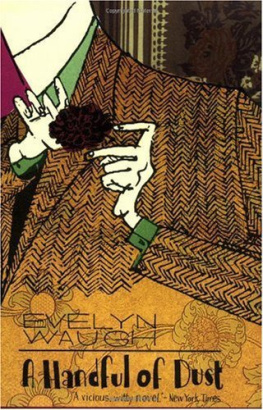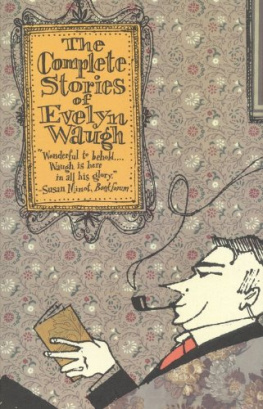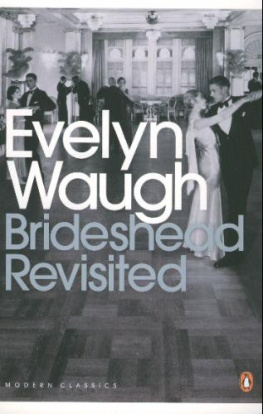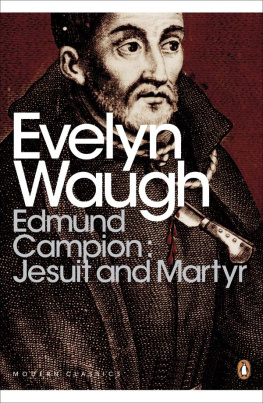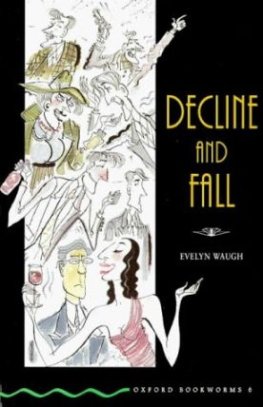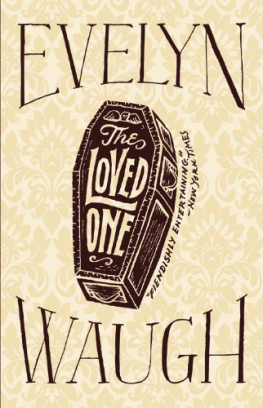Evelyn Waugh - A Handful of Dust (Everymans Library)
Here you can read online Evelyn Waugh - A Handful of Dust (Everymans Library) full text of the book (entire story) in english for free. Download pdf and epub, get meaning, cover and reviews about this ebook. year: 2002, publisher: Everymans Library, genre: Detective and thriller. Description of the work, (preface) as well as reviews are available. Best literature library LitArk.com created for fans of good reading and offers a wide selection of genres:
Romance novel
Science fiction
Adventure
Detective
Science
History
Home and family
Prose
Art
Politics
Computer
Non-fiction
Religion
Business
Children
Humor
Choose a favorite category and find really read worthwhile books. Enjoy immersion in the world of imagination, feel the emotions of the characters or learn something new for yourself, make an fascinating discovery.
- Book:A Handful of Dust (Everymans Library)
- Author:
- Publisher:Everymans Library
- Genre:
- Year:2002
- Rating:5 / 5
- Favourites:Add to favourites
- Your mark:
- 100
- 1
- 2
- 3
- 4
- 5
A Handful of Dust (Everymans Library): summary, description and annotation
We offer to read an annotation, description, summary or preface (depends on what the author of the book "A Handful of Dust (Everymans Library)" wrote himself). If you haven't found the necessary information about the book — write in the comments, we will try to find it.
A Handful of Dust (Everymans Library) — read online for free the complete book (whole text) full work
Below is the text of the book, divided by pages. System saving the place of the last page read, allows you to conveniently read the book "A Handful of Dust (Everymans Library)" online for free, without having to search again every time where you left off. Put a bookmark, and you can go to the page where you finished reading at any time.
Font size:
Interval:
Bookmark:
A HANDFUL OF DUST is Evelyn Waugh's scathing commentary on the well-mannered death struggles of the upper classes-an irrepressibly amusing picture of society politely blowing its own brains out, with a defiant smile. It tells of Brenda, Tony and their friends-a wonderfully congenial group who live by a unique set of social standards. According to their rules, any sin is acceptable provided it is carried off in good taste.
A Handful of Dust, (c) Copyright 1934, by Evelyn Waugh
CONTENTS
A Handful of Dust
1. Du Ct de Chez Beaver 2. English Gothic-I 3. Hard Cheese on Tony 4. English Gothic-II 5. In Search of a City 6. Du Ct de Chez Todd 7. English Gothic-III
A HANDFUL OF DUST
... I will show you something different from either Your shadow at morning striding behind you Or your shadow at evening rising to meet you; I will show you fear in a handful of dust. -THE WASTELAND
CHAPTER ONE
Du Ct de Chez Beaver
"WAS anyone hurt?" "No one I am thankful to say," said Mrs. Beaver, "except two housemaids who lost their heads and jumped through a glass roof into the paved court. They were in no danger. The fire never properly reached the bedrooms I am afraid. Still they are bound to need doing up, everything black with smoke and drenched in water and luckily they had that old-fashioned sort of extinguisher that ruins everything. One really cannot complain. The chief rooms were completely gutted and everything was insured. Sylvia Newport knows the people. I must get on to them this morning before that ghoul Mrs. Shutter snaps them up." Mrs. Beaver stood with her back to the fire, eating her morning yoghort. She held the carton close under her chin and gobbled with a spoon. "Heavens, how nasty this stuff is. I wish you'd take to it, John. You're looking so tired lately. I don't know how I should get through my day without it." "But, mumsey, I haven't as much to do as you have." "That's true, my son." John Beaver lived with his mother at the house in Sussex Gardens where they had moved after his father's death. There was little in it to suggest the austerely elegant interiors which Mrs. Beaver planned for her customers. It was crowded with the unsaleable furniture of two larger houses, without pretension to any period, least of all to the present. The best pieces and those which had sentimental interest for Mrs. Beaver were in the L-shaped drawing room upstairs. Beaver had a dark little sitting room on the ground floor behind the dining room, and his own telephone. The elderly parlourmaid looked after his clothes. She also dusted, polished and maintained in symmetrical order on his dressing table and on the top of his chest of drawers, the collection of sombre and bulky objects that had stood in his father's dressing room; indestructible presents for his wedding and twenty-first birthday, ivory, brass bound; covered in pigskin, crested and gold mounted, suggestive of expensive Edwardian masculinity-racing flasks and hunting flasks, cigar cases, tobacco jars, jockeys, elaborate meerschaum pipes, button hooks and hat brushes. There were four servants, all female and all, save one elderly. When anyone asked Beaver why he stayed there instead of setting up on his own, he sometimes said that he thought his mother liked having him there (in spite of her business she was lonely); sometimes that it saved him at least five pounds a week. His total income varied around six pounds a week, this was an important saving. He was twenty-five years old. From leaving Oxford until the beginning of the slump he had worked in an advertising agency. Since then no one had been able to find anything for him to do. So he got up late and sat near his telephone most of the day, hoping to be called up. Whenever it was possible, Mrs. Beaver took an hour off in the middle of the morning. She was always at her shop punctually at nine, and by half past eleven she needed a break. Then, if no important customer was imminent, she would get into her two-seater and drive home to Sussex Gardens. Beaver was usually dressed by then and she had grown to value their morning interchange of gossip. "What was your evening?" "Audrey rang me up at eight and asked me to dinner. Ten of us at the Embassy, rather dreary. Afterwards we all went on to a party by a woman called de Trommet." "I know who you mean. American. She hasn't paid for the toile-de-jouy chaircovers we made her last April. I had a dull time too; didn't hold a card all the evening and came away four pounds ten to the bad." "Poor mumsey." "I'm lunching at Viola Chasm's. What are you doing? I didn't order anything here I'm afraid." "Nothing so far. But I can always go round to Brat's." "But that's so expensive. I'm sure if we ask Chambers she'll be able to get you something in. I thought you were certain to be out." "Well I still may be. It isn't twelve yet." Most of Beaver's invitations came to him at the last moment; occasionally even later, when he had already begun to eat a solitary meal from a tray (... "John, darling, there's been a muddle and Sonia has arrived without Reggie. Could you be an angel and help me out. Only be quick, because we're going in now"). Then he would go precipitately for a taxi and arrive, with apologies, after the first course... One of his few recent quarrels with his mother had occurred when he left a luncheon party of hers in this way. "Where are you going for the week-end?" "Hetton." "Who's that? I forget?" "Tony Last." "Yes, of course. She's lovely, he's rather a stick. I didn't know you knew them." "Well I don't really. Tony asked me in Brat's the other night. He may have forgotten." "Send a telegram and remind them. It is far better than ringing up. It gives them less chance to make excuses. Send it tomorrow just before you start. They owe me for a table." "What's their dossier?" "I used to see her quite a lot before she married. She was Brenda Rex, Lord St. Cloud's daughter, very fair, under-water look. People used to be mad about her when she was a girl. Everyone thought she would marry Jock Grant-Menzies at one time. Wasted on Tony Last, he's a prig. I should say it was time she began to be bored. They've been married five or six years. Quite well off but everything goes in keeping up the house. I've never seen it but I've an idea it's huge and quite hideous. They've got one child at least, perhaps more." "Mumsey, you are wonderful. I believe you know about everyone." "It's a great help. All a matter of paying attention while people are talking." Mrs. Beaver smoked a cigarette and then drove back to her shop. An American woman bought two patch-work quilts at thirty guineas each, Lady Metroland telephoned about a bathroom ceiling, an unknown young man paid cash for a cushion; in the intervals between these events, Mrs. Beaver was able to descend to the basement where two dispirited girls were packing lampshades. It was cold down there in spite of a little oil stove and the walls were always damp. The girls were becoming quite deft, she noticed with pleasure, particularly the shorter one who was handling the crates like a man. "That's the way," she said, "you are doing very nicely, Joyce. I'll soon get you on to something more interesting." "Thank you, Mrs. Beaver." They had better stay in the packing department for a bit, Mrs. Beaver decided; as long as they would stand it. They had neither of them enough chic to work upstairs. Both had paid good premiums to learn Mrs. Beaver's art. Beaver sat on beside his telephone. Once it rang and a voice said, "Mr. Beaver? Will you please hold the line, sir, Lady Tipping would like to speak to you." The intervening silence was full of pleasant expectation. Lady Tipping had a luncheon party that day, he knew; they had spent some time together the evening before and he had been particularly successful with her. Someone had chucked... "Oh, Mr. Beaver, I am so sorry to trouble you. I was wondering, could you possibly tell me the name of the young man you introduced to me last night at Madame de Trommet's? The one with the reddish moustache. I think he was in Parliament." "I expect you mean Jock Grant-Menzies." "Yes, that's the name. You don't by any chance know where I can find him, do you?" "He's in the book but I don't suppose he'll be at home now. You might be able to get him at Brat's at about one. He's almost always there." "Jock Grant-Menzies, Brat's Club. Thank you so very much. It is kind of you. I hope you will come and see me some time: Goodbye." After that the telephone was silent. At one o'clock Beaver despaired. He put on his overcoat, his gloves, his bowler hat and with neatly rolled umbrella set off to his club, taking a penny bus as far as the corner of Bond Street. The air of antiquity pervading Brat's, derived from its elegant Georgian faade and finely panelled rooms, was entirely spurious, for it was a club of recent origin, founded in the burst of bonhommie immediately after the war. It was intended for young men, to be a place where they could straddle across the fire and be jolly in the card room without incurring scowls from older members. But now these founders were themselves passing into middle age; they were heavier, balder and redder in the face than when they had been demobilised, but their joviality persisted and it was their turn now to embarrass their successors, deploring their lack of manly and gentlemanly qualities. Six broad backs shut Beaver from the bar. He settled in one of the armchairs in the outer room and turned over the pages of the New Yorker, waiting until someone he knew should turn up. Jock Grant-Menzies came upstairs. The men at the bar greeted him saying, "Hullo, Jock old boy, what are you drinking?" or simply "Well, old boy?" He was too young to have fought in the war but these men thought he was all right; they liked him far more than they did Beaver, who, they thought, ought never to have got into the club at all. But Jock stopped to talk to Beaver. "Well, old boy," he said. "What are you drinking?" "Nothing so far." Beaver looked at his watch. "But I think it's time I had one. Brandy and ginger ale." Jock called the barman and then said: "Who was the old girl you wished on me at that party last night?" "She's called Lady Tipping." "I thought she might be. That explains it. They gave me a message downstairs that someone with a name like that wanted me to lunch with her." "Are you going?" "No, I'm no good at lunch parties. Besides I decided when I got up that I'd have oysters here." The barman came with the drinks. "Mr. Beaver, sir, there's ten shillings against you in my books for last month." "Ah, thank you, Macdougal, remind me some time, will you?" "Very good, sir." Beaver said, "I'm going to Hetton tomorrow." "Are you now? Give Tony and Brenda my love." "What's the form?" "Very quiet and enjoyable." "No paper games?" "Oh, no, nothing like that. A certain amount of bridge and backgammon and low poker with the neighbours." "Comfortable?" "Not bad. Plenty to drink. Rather a shortage of bathrooms. You can stay in bed all the morning." "I've never met Brenda." "You'll like her, she's a grand girl. I often think Tony Last's one of the happiest men I know. He's got just enough money, loves the place, one son he's crazy about, devoted wife, not a worry in the world." "Most enviable. You don't know anyone else who's going, do you? I was wondering if I could get a lift down there." I don't I'm afraid. It's quite easy by train." "Yes, but it's more pleasant by road." "And cheaper." "Yes, and cheaper I suppose... well, I'm going down to lunch. You won't have another?" Beaver rose to go. "Yes, I think I will." "Oh, all right. Macdougal. Two more please." Macdougal said, "Shall I book them to you, sir?" "Yes, if you will." Later, at the bar, Jock said, "I made Beaver pay for a drink." "He can't have liked that." "He nearly died of it. Know anything about pigs?" "No. Why?" "Only that they keep writing to me about them from my constituency." Beaver went downstairs but before going into the dining room he told the porter to ring up his home and see if there was any message for him. "Lady Tipping rang up a few minutes ago and asked whether you could come to luncheon with her today." "Will you ring her up and say that I shall be delighted to but that I may be a few minutes late." It was just after half past one when he left Brat's and walked at a good pace towards Hill Street.
Next pageFont size:
Interval:
Bookmark:
Similar books «A Handful of Dust (Everymans Library)»
Look at similar books to A Handful of Dust (Everymans Library). We have selected literature similar in name and meaning in the hope of providing readers with more options to find new, interesting, not yet read works.
Discussion, reviews of the book A Handful of Dust (Everymans Library) and just readers' own opinions. Leave your comments, write what you think about the work, its meaning or the main characters. Specify what exactly you liked and what you didn't like, and why you think so.

